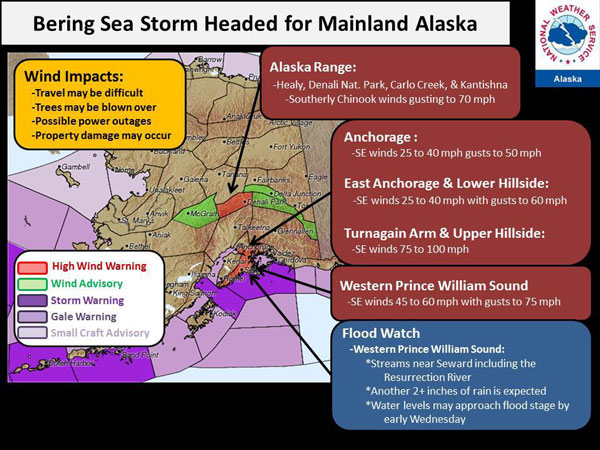
A powerful storm is moving into Southcentral Alaska this evening, continuing into early tomorrow morning.
The strongest winds are expected to hit Anchorage’s Upper Hillside and Eagle River Valley. Strong winds are also expected to sweep through the lower hillside and the lower elevations of East Anchorage.
The National Weather Service says this storm is more typical during the winter and has the potential to produce more damage than normal.
See below for storm-preparedness links and contact information:
- National Weather Service Statement
- Alaska Division of Homeland Security & Emergency Management
- Municipal Light and Power
ML&P hotline for power outages/downed lines & trees: 279-7671 or toll-free at 1-888-999-5340 - Chugach Electric
Chugach Electric numbers to report power outages/downed lines & trees: 762-7888 or toll-free at 1-800-478-7494
Check back later for a full report on what to expect from the storm from KSKA’s Daysha Eaton.
Daysha Eaton is a contributor with the Alaska Public Radio Network.
Daysha Eaton holds a B.A. from Evergreen State College, and a M.A. from the University of Southern California. Daysha got her start in radio at Seattle public radio stations, KPLU and KUOW. Before coming to KBBI, she was the News Director at KYUK in Bethel. She has also worked as the Southcentral Reporter for KSKA in Anchorage.
Daysha's work has appeared on NPR's "Morning Edition" and "All Things Considered", PRI's "The World" and "National Native News". She's happy to take assignments, and to get news tips, which are best sent via email.
Daysha became a journalist because she believes in the power of storytelling. Stories connect us and they help us make sense of our world. They shed light on injustice and they comfort us in troubled times. She got into public broadcasting because it seems to fulfill the intention of the 4th Estate and to most effectively apply the freedom of the press granted to us through the Constitution. She feels that public radio has a special way of moving people emotionally through sound, taking them to remote places, introducing them to people they would not otherwise meet and compelling them to think about issues they might ordinarily overlook.




